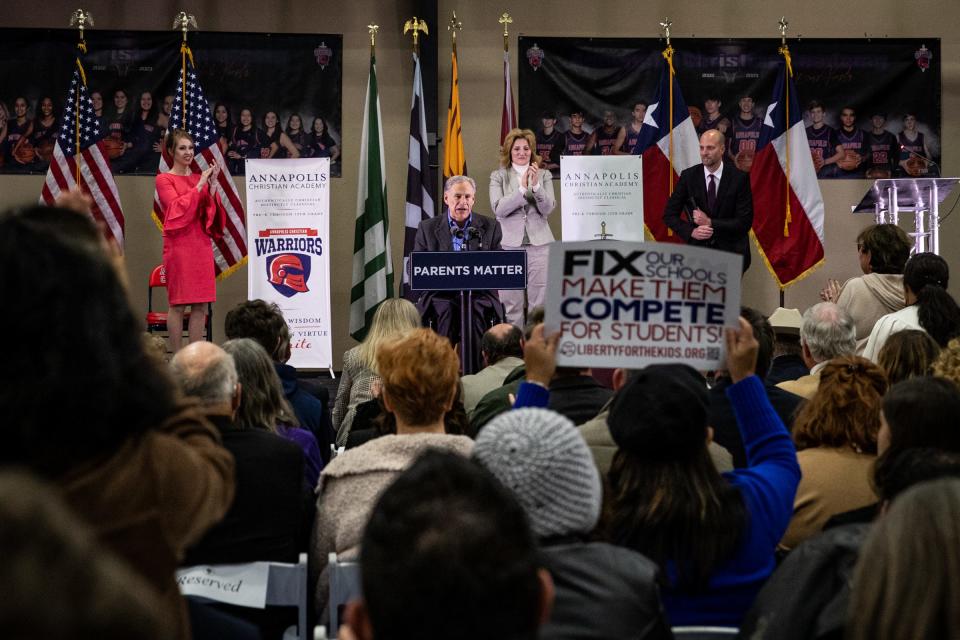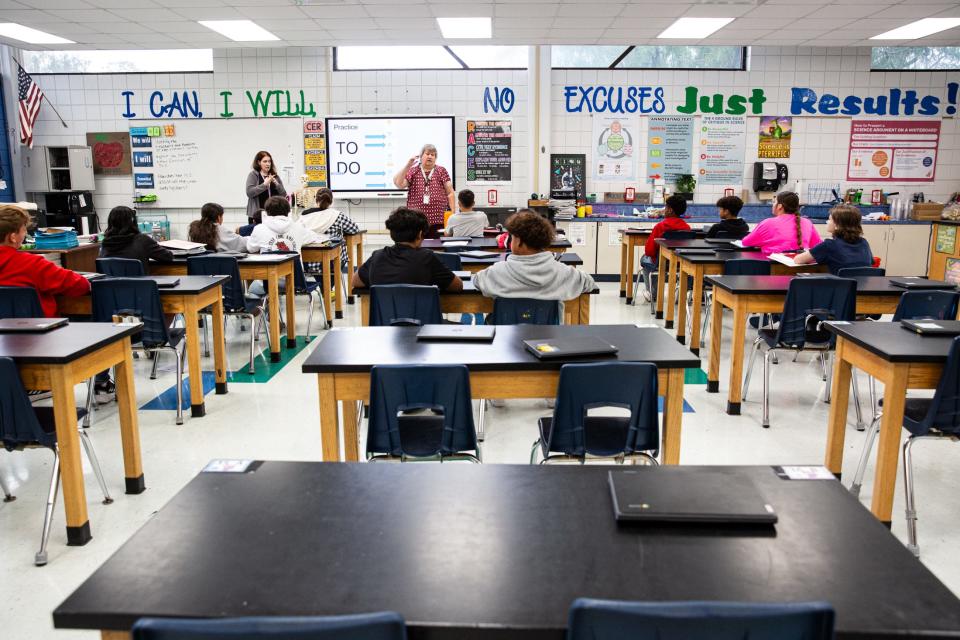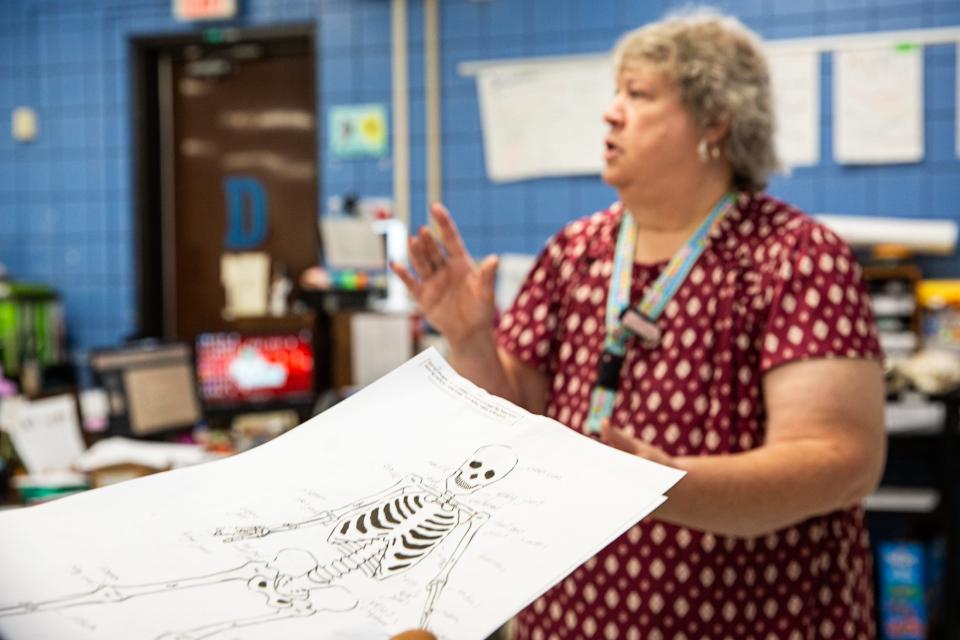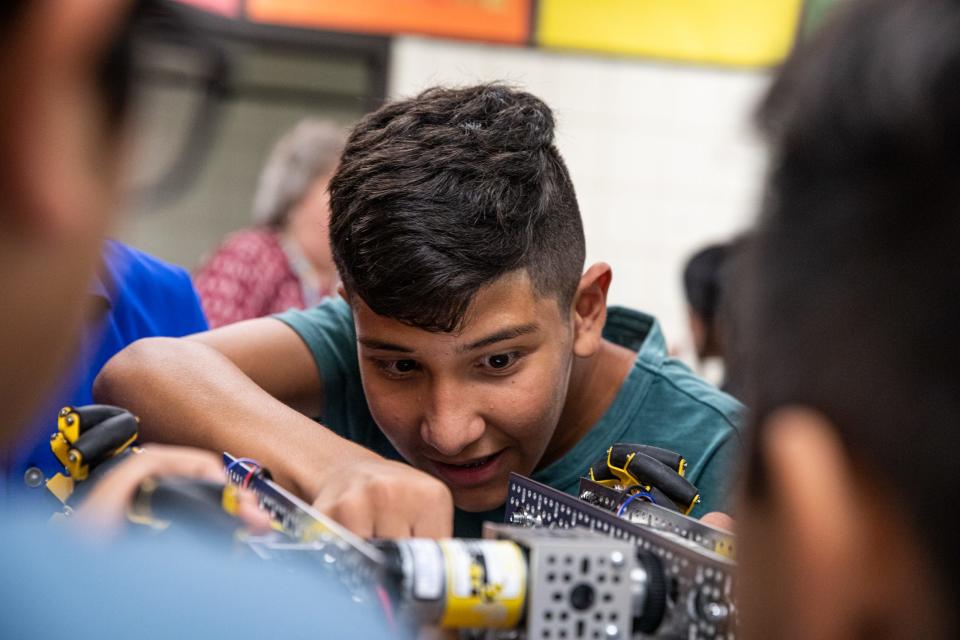Teacher support falls to local school leaders as Texas Legislature spars over education
About 180 students come into Kaffie Middle School teacher’s Cynthia Hopkins’s seventh grade science classroom every day, joining two axolotls, a bearded dragon, a blue tongue skink, clown fish and guppies.
It’s a remarkable time for Hopkins, who was named one of three finalists for Texas Secondary Teacher of the Year last month. Over the past decade, Hopkins has earned a Ph.D., achieved a prestigious national educator certification, served on the state’s Teacher Vacancy Task Force and fought cancer.
But this school year, her 17th in the classroom, didn’t start quite as she’d hoped.
As a member of the teacher vacancy task force, Hopkins spent 2022 helping to develop recommendations for how Texas can address teacher retention and recruitment challenges. The group released a final report in February, leaving it to lawmakers to put it all into action.
But when teachers across the state returned to the classroom this fall, little had changed. A big push for better teacher compensation and increased school funding failed to pass the finish line, and other recommendations focused on training, support and working conditions were similarly neglected.
“I feel like it was politically held hostage,” Hopkins said. “There was a residency program that was a part of it that seemed to get some traction, so that’s good. But all the rest of it was held hostage for vouchers.”
Like many in public schools, Hopkins eyes voucher efforts with concern, critical of anything that might siphon funds from public schools to private institutions that are not available to all students and are not held accountable by the state.
Gov. Greg Abbott made education savings accounts, a voucher-like program that would allow parents to spend taxpayer dollars on private school tuition, a priority this year, traveling the state to talk about school choice in front of private school audiences. Abbott visited Corpus Christi’s Annapolis Christian Academy in January.

But lawmakers in the Texas House of Representatives, including many rural Republicans and Democrats, have historically opposed voucher programs.
This spring, after a bill specifically introducing education savings accounts failed, Senate lawmakers tried again, shoehorning education savings accounts into a Texas House of Representatives bill that would have sent billions of dollars of new funding to Texas public schools.
Lawmakers return to work Oct. 9 during a special session that is expected to focus on education. It remains to be seen whether any of the task force’s goals will be resurrected.
Without the school funding boost they’d hoped for, school leaders across the Coastal Bend found ways to increase employee pay on their own.
The raises were small, coming at times at the expense of district savings accounts or relying on funding sources that might not be around for much longer. Corpus Christi ISD passed a deficit budget. It began the year with about 100 teacher vacancies.
Staff retention is an issue
Nancy Vera is the president of the Corpus Christi American Federation of Teachers. Vera said that pay is on reason a teacher might consider leaving a district, along with working conditions and how supportive school leaders, families and the community is of teachers.
Vera said that there is a lack of respect for public school teachers, with pay remaining stagnant as teachers have faced increased pressures due to the pandemic and the impact it had on student learning and behavior.
“They are getting burned out,” Vera said, citing local teacher vacancies. “That’s why there’s an exodus of teachers.”
La Tricia Johnson is the director of strategic evaluation systems and support at Corpus Christi ISD and a former classroom teacher.
“The beauty of being American is we are entitled to this free public education,” Johnson said. “The flip side of that is how do we then advocate to make sure people recognize what support is needed.”
Teacher compensation varies in the Coastal Bend
Texas mandates a minimum salary for teachers and full-time librarians, counselors and registered nurses, based on a 10-month contract with a minimum of 187 days of service, but that minimum hasn’t increased since the 2019-2020 school year and is far below what many school districts actually offer.
The state minimum salary for a beginning teacher is $33,660. For a twenty-year veteran teacher, the minimum salary set by the state is $54,540.
According to the National Education Association, the average starting teacher salary in the U.S. is $42,844, while the average public school teacher salary is $66,745. Teachers are making $3,644 less on average than they did 10 years ago when adjusted for inflation.
In Texas, the average starting salary is $45,493, but the average teacher salary is $58,887, based on 2021-22 estimates.
In the Coastal Bend, most districts offer at least $45,000 to beginning teachers. Many offer upwards of $50,000 for a beginning teacher, though often the gap between the state minimum and local pay shrinks for veteran teachers.
In Corpus Christi ISD, base pay for a beginning teacher starts at $52,000, jumping by $500 for one year of experience and increasing by hundreds of dollars for each year of additional experience.
Generally, the CCISD pay scale is in line with other Corpus Christi-area school districts. Flour Bluff ISD, West Oso ISD, Tuloso-Midway ISD and Calallen ISD all also serve students in Corpus Christi. For each of these districts, pay begins between $50,000 and $51,500 for a beginning teacher.
Tuloso-Midway ISD and Calallen ISD are comparable, both starting at $51,500, though Calallen ISD increases at a higher rate, reaching $67,380 by year 30, compared to $65,909 in Tuloso-Midway ISD.
Fanning out beyond Corpus Christi city limits, there are variations in teacher pay.
North of Nueces Bay, Gregory-Portland ISD has the highest base pay scale in the region, starting at $61,500 and reaching over $79,000 for a 30-year teacher.
In other towns, like Kingsville ISD, Alice ISD, Robstown ISD, Ingleside ISD and Beeville ISD, beginning base pay ranges between $50,900 and $53,500 for a beginning teacher, similar to the Corpus Christi districts.
Some of the small and rural districts, such as London ISD, Port Aransas ISD, Banquete ISD, George West ISD start lower, between $45,000 and $50,000.
Most districts offer additional pay if a teacher has a master’s degree or if they take on additional duties. Districts also might offer incentives for positions that are harder fill, such as bilingual teachers and special education teachers.
In recent years, districts have also dedicated federal pandemic relief funds to one-time stipends. There are also differences in the benefits offered by different school districts.
Why does teacher pay vary by school district?
Variations in compensation from district to district are tied to the complicated Texas’s school funding formula. Across the board, educators see areas for improvement.
In Texas, each school district is entitled to a certain amount of funding per student known as the basic allotment, which is currently set at $6,160. Districts do get additional funding based on the number of special education, bilingual and economically disadvantaged students. There are also extra dollars for small districts and fast-growing districts.
The basic allotment is supposed to be sufficient to ensure a basic level of education. It’s the figure the state uses to determine how much state aid a district can count on and how much local property tax revenues a school district can keep.

The Texas Association of School Boards and Texas American Federation of Teachers are among the groups that call for an increase in the basic allotment.
Karen Griffith, CCISD deputy superintendent of business and support services, said that the current cost to educate a child in CCISD is about $9,400.
Pay scales for teachers and all other district employees are approved by the district’s elected school board based on recommendations by administration. Staff pay and benefits make up the bulk of spending for school districts. Revenue comes from local property taxes and state aid, as well as typically small amounts of federal funding.
Per-student state funding is multiplied by a district’s average daily attendance.
This means that the per-student amount a district receives from the state isn’t based on the amount of students it is responsible for educating over the course of a year, but on the amount of students who show up on an average day.
So, schools with higher attendance rates can count on more state funding.
Corpus Christi ISD and West Oso ISD both passed deficit budgets for 2023-24, both citing low enrollments.
Even so, the CCISD $25.8 million deficit budget included a $250 increase in the starting salary for teachers and step increases of $600 for teachers with up to five years of experience and $900 for teachers with six or more years of experience, along with raises for counselors, administrators and auxiliary staff.
CCISD also used federal funds for one-time stipends.
In West Oso ISD, the school board approved a 1% across the board raise, equity adjustments and an expansion of the pay scale to reward longtime employees. Part of the budget struggle at West Oso ISD is that past budgets and spending were based on overenthusiastic enrollment figures that did not come to pass.
West Oso ISD is also holding a Voter-Approval Tax Rate Election in November. If voters support the measure, it could reconsider the budget and further increase pay.
Staff in Gregory-Portland ISD are among the highest paid in the area.
Historically, G-PISD leaders have cited a tax incentive program as one reason it is able to compensate employees at a higher level than neighboring districts.
At the end of 2022, a section of the state tax code known as Chapter 313 expired. The program allowed school districts to approve property tax value limitations for some business developments. In return, districts could negotiate supplementary payments directly from companies. These funds are not subject to recapture.
Though the program expired in December, G-PISD collected millions each year in supplementary payments from local industry and will continue to do so until the existing agreements approved before the end of the program expire over the next few decades.
Since 2016-17, G-PISD has received $77.5 million in revenue protection payments from the state to address any lost revenue due to the tax incentives and supplemental payments from industry.
The legislature approved a replacement tax incentive program, but this program would not allow the supplemental payments or include revenue protection for schools.
Few districts have benefited from Chapter 313 like G-PISD, which currently has 15 agreements in place.
According to Texas Comptroller records, many Coastal Bend districts don’t have a single Chapter 313 agreement and none in the region have had as many as G-PISD.
Beyond the school finance system, there are other ways communities have found to support educators. In Port Aransas ISD, community members launched the Marlin Legacy Foundation last year to raise funds specifically to benefit school staff.
The foundation has raised more than $300,000 so far for the district. These funds can be used for “non-essential” education purposes, covering the cost of stipends for employees such as librarians, nurses, custodians, bus drivers and elective teachers. With this additional funding, the district has been able to offer stipends to all employees.
At the state level, there is another effort to boost teacher pay, the Teacher Incentive Allotment.
What is the Teacher Incentive Allotment?
In 2019, the state created the Teacher Incentive Allotment program, giving top teachers the opportunity to earn potentially six-figure salaries. In districts that create a local TIA pathway, eligible teachers can earn anywhere from an additional $3,000 to $32,000 annually for five years, with the exact allotment amount depending on student growth.
Districts must first create a plan determining how allotments are awarded, before spending a year collecting data and another year validating the data before any teachers can receive an allotment.
Corpus Christi ISD completed data collection for the first cohort of teachers, primarily in math, science, social studies and English, last year. It is currently collecting data on a second batch of teachers, including career and technical education, fine arts and physical education teachers.
“This is one of the opportunities to level the playing field for educators and recognize all the work they do,” Johnson said.
During data collection, student progress is assessed throughout the year. Better student outcomes result in a higher designation and allotment level.
“That’s the beauty of it,” Johnson said. “It really goes back to our student and their performance. We know that all good teachers are always working on making progress with their students.”
There is a second way that teachers can qualify for an allotment even if their district does not have a local designation system set up yet. Teachers with an active National Board Certification can automatically earn a “Recognized” designation, entitling them to between $3,000 and $9,000.
Hopkins has held a National Board Certification since 2015, a process she went through due to her dedication to always growing and improving. She is currently mentoring teachers in the district, region and across the state who are working towards National Board Certification.
“It is the most rigorous professional development you can put yourself through because you’re looking at yourself and your practices,” Hopkins said. “...I want to be the very best teacher I can be for my kids in the classroom. That taught me how to be reflective to see what I’m bringing into the classroom.”
The end goal, Hopkins said, not quite joking, is for all her students to become scientists.
“My kids, I want them to get a love of science,” Hopkins said. “...I want my kids to become science-literate.”

Hopkins remembers her own seventh grade science teacher, a man who helped inspire her own love of science.
“He taught us how to think,” Hopkins said. “That’s what I’m hoping to do with my kids. I’ve had kids, they’re now doctors and scientists and doing this incredible stuff.”
There are only five National Board Certified teachers in Corpus Christi ISD, including Hopkins. The first round of CCISD teachers to qualify for a teacher incentive allotment under the local designation system won’t learn if they’re receiving anything until the end of the school year.
Hopkins said that some teachers have worries about the Teacher Incentive Allotment – will lawmakers continue to support the program? Is it feasible for every teacher in the state to qualify?
“It’s something,” Johnson said. “Until the TEA or the state says we have no more money, I sat to teachers, take advantage of what you can get because it’s more than what you were getting.”
According to the TIA website, 346 districts have participated in the program, with 13,774 teachers earning an allotment.
“But at some point, the state has to come up with more money,” Hopkins said. “Inflation has a 17-year teacher’s salary at what it was when I started. Are we really valuing our teachers and what they do?”
Teacher and classroom impacts
Like many teachers, Hopkins spends some of her paycheck on her students. This month, she plans to buy eggs for a lab activity.
“You think eggs are cheap, right?” Hopkins said. “But when you need to buy 90 of them?”
Eventually, with underfunded schools and tight teacher paychecks, it becomes a question — to provide the best experience for the students, will the teacher’s family need to go without?
At Texas A&M University-Corpus Christi, Hopkins teaches a class for prospective teachers. From this next generation of educators, Hopkins hears a lot of concerns. These young teachers think differently than she does, Hopkins said.
“My generation, we’re king of loyal and we’ll stick it out,” Hopkins said. “And we’re finding with this new generation, (teaching) is a job.”
Young people are concerned about work-life balance, Hopkins said. The difference in mindsets raises questions, Hopkins said.
“This is a thought for the community – have we taken advantage of those people who have that passion for their career, for the greater good, for society’s benefit?” Hopkins said. “Have we just been taking them for granted?”
Reflecting on the politization of education, Hopkins had several messages she’d like lawmakers and the public to hear.
“Public education works,” Hopkins said. “Number two, pay attention to what the teachers are saying. We need to be at the table... the number one thing for teachers, is love on your kids, to love and respect them as people. Parents – teachers want the very best for your kids.”

Gregory-Portland ISD staff share classroom insights with TEA commissioner
West Oso ISD approves deficit budget, small raises for teachers
Texas releases 2023 STAAR results. Here's how Corpus Christi did.
Corpus Christi ISD joins lawsuit against TEA over school ratings
This article originally appeared on Corpus Christi Caller Times: Here's how Coastal Bend teacher pay compares with no new state dollars

